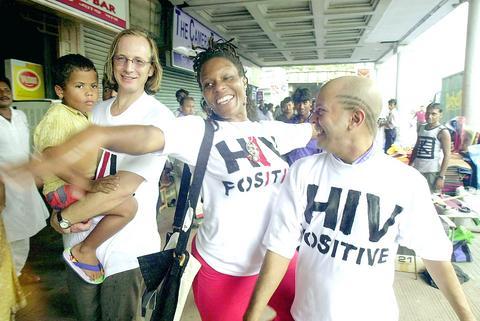Top researchers, policymakers and activists head to Bangkok this week to assess the global AIDS pandemic as the killer disease is poised to ravage Eastern Europe and Asia's most populous countries.
Up to 20,000 people are registered for the conference starting on Sunday, making it the biggest potential turnout for any meeting in the 23-year history of AIDS and the first time this key event will be held in a developing country in Asia.
Ahead of the conference, the UN agency UNAIDS will tomorrow issue its first detailed update on the world epidemic in two years, giving the latest estimated toll of deaths and new infections and country-by-country figures.

PHOTO: AFP
Since it first came to light in 1981, acquired immune deficiency syndrome has left no cranny of the world unscathed.
According to previous estimates, the disease had claimed some 25 million to 26 million lives as of last year, and around 40 million people were living with the disease or the virus that causes it. Around 14,000 more people each day become infected.
There is no cure for HIV, only antiretroviral drugs which keep the virus at bay and which are only just now starting to trickle into poor countries that need them most. And any vaccine to prevent infection seems to lie years away.
Ironically, says UNAIDS Executive Director Peter Piot, the picture is brighter today than it has been in years.
"The landscape of AIDS has changed quite dramatically," he said in a phone interview. "In developing countries, our work has changed, especially in Africa."
The main improvement, he said, is that money is at last starting to flow in big volumes, with funds reaching more than US$5 billion this year alone.
This is still not enough to meet needs, but -- combined with big price cuts for drugs -- it has given a kickstart to the UN's goal of providing three million poor people with antiretroviral therapy by the end of next year.
China, India and Indonesia -- Asia's Big Three, accounting for more than a third of humanity -- are ripe targets for AIDS, as are the former Soviet-bloc countries, experts say.
Each nation is different, but a common thread binds them. The bitter experience of the US, Europe and Africa shows how ignorance, stigma, official indifference and poor resources become a lethal combination, enabling the virus to leap out of small, localized demographic pools and into the population mainstream.
"The handshake of [Chinese] Premier Wen Jiabao (
But, he said, the level of political awareness was not the same in Eastern Europe, facing the fastest-growing HIV spread of any region in the world.
As for India and its neighbors, "the leaders are in a state of denial and there is a very high level of discomfort to even talk about it," Praful Patel, the World Bank's regional vice president, complained last Wednesday. "[They thought] HIV-AIDS is an African problem and it cannot happen in South Asia."

PRECARIOUS RELATIONS: Commentators in Saudi Arabia accuse the UAE of growing too bold, backing forces at odds with Saudi interests in various conflicts A Saudi Arabian media campaign targeting the United Arab Emirates (UAE) has deepened the Gulf’s worst row in years, stoking fears of a damaging fall-out in the financial heart of the Middle East. Fiery accusations of rights abuses and betrayal have circulated for weeks in state-run and social media after a brief conflict in Yemen, where Saudi airstrikes quelled an offensive by UAE-backed separatists. The United Arab Emirates is “investing in chaos and supporting secessionists” from Libya to Yemen and the Horn of Africa, Saudi Arabia’s al-Ekhbariya TV charged in a report this week. Such invective has been unheard of

‘TERRORIST ATTACK’: The convoy of Brigadier General Hamdi Shukri resulted in the ‘martyrdom of five of our armed forces,’ the Presidential Leadership Council said A blast targeting the convoy of a Saudi Arabian-backed armed group killed five in Yemen’s southern city of Aden and injured the commander of the government-allied unit, officials said on Wednesday. “The treacherous terrorist attack targeting the convoy of Brigadier General Hamdi Shukri, commander of the Second Giants Brigade, resulted in the martyrdom of five of our armed forces heroes and the injury of three others,” Yemen’s Saudi Arabia-backed Presidential Leadership Council said in a statement published by Yemeni news agency Saba. A security source told reporters that a car bomb on the side of the road in the Ja’awla area in

US President Donald Trump on Saturday warned Canada that if it concludes a trade deal with China, he would impose a 100 percent tariff on all goods coming over the border. Relations between the US and its northern neighbor have been rocky since Trump returned to the White House a year ago, with spats over trade and Canadian Prime Minister Mark Carney decrying a “rupture” in the US-led global order. During a visit to Beijing earlier this month, Carney hailed a “new strategic partnership” with China that resulted in a “preliminary, but landmark trade agreement” to reduce tariffs — but

SCAM CLAMPDOWN: About 130 South Korean scam suspects have been sent home since October last year, and 60 more are still waiting for repatriation Dozens of South Koreans allegedly involved in online scams in Cambodia were yesterday returned to South Korea to face investigations in what was the largest group repatriation of Korean criminal suspects from abroad. The 73 South Korean suspects allegedly scammed fellow Koreans out of 48.6 billion won (US$33 million), South Korea said. Upon arrival in South Korea’s Incheon International Airport aboard a chartered plane, the suspects — 65 men and eight women — were sent to police stations. Local TV footage showed the suspects, in handcuffs and wearing masks, being escorted by police officers and boarding buses. They were among about 260 South